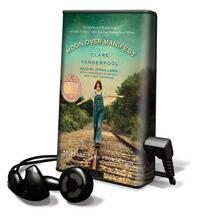Take a photo of a barcode or cover
I really wanted to love this book. The writing is superb and the strong voice is astounding. I was really happy to encounter a middle grade novel with a female character such as Abilene and her new friends. So I was a little disappointed to find the flashbacks about the boys' adventures formed the bulk of the real action. I hope this structure wasn't influenced by the need to cater to a boy audience by writing an ensemble cast. All I wanted to read about was Abilene, and so I lost interest toward the end.
This story reminded me of the film Paper Moon for some reason.
I also love the cover design.
This story reminded me of the film Paper Moon for some reason.
I also love the cover design.
3.5 stars. I couldn’t help but compare it to Clare Vanderpool’s other book, Navigating Early, which I loved so dearly. I didn’t love this book quite as much, but it was slow and sweet.
“Who would dare think the outcast and abandoned can find a home? Who would dream that one can love without being crushed under the weight of it? A miracle cure to heal the sick? Pah. What makes us think any of this could be true? And yet all of us, we participate in this myth, we create it, perpetuate it.”
This is a Newberry award winner so of course I had high expectations. While I thoroughly enjoyed this book, I think adults will like it more than children. It seems like Newberry's have a historical context that doesn't always connect with kids. In this book, Abilene is sent to the town of Manifest to live for the summer, instead of train hopping with her father. In the town, she uncovers a mystery box in her room with some letters and tokens. As she works off a debt to Miss Sadie, a strange gypsy diviner, she learns more about the town and what happened during the 1920's and World War One. She also is desperately trying to find some connection to her father. The characters are full and rich and the story has a nice balance of action and dialogue. It is an emotional story and gives a lot of background to the 'dry' period where no alcohol was sold, as well as the distrust of immigrants during WWI. This is a definite winner for any student who likes historical fiction, and I think girls would enjoy it more than boys.
This was a cute book. I enjoyed the dual stories that combined. I think i preferred the story from 1918. I thought it seemed very accurate with the racism the immigrants went through. As well as the experiences with the spanish flu and WW1. I laughed and i cried.
What I loved most about this book was the way the past and present became intertwined throughout the course of the story. I also really liked that Abilene came to the same conclusion I did fairly early in the story rather than being blind to what was right in front of her, which would have felt very unrealistic considering Abilene's character.
I love Abilene's voice as well and how smart and savvy she is. She's a scrappy girl who I rooted for. The book started off a little bit slow, but it was worth the read to keep going. Very enjoyable.
I love Abilene's voice as well and how smart and savvy she is. She's a scrappy girl who I rooted for. The book started off a little bit slow, but it was worth the read to keep going. Very enjoyable.
Enjoyed it. Took time to get into story. Endearing characters. Sweet story. First and third person point of view.
I enjoyed the premise of this book but a few pages into the book it started to feel like so many other books of this genre. Nothing stood out from the characters, of which most lacked significant development or development of any kind, to the split narrative stream, to the revelation of answers to the protagonist's pressing questions posed throughout the start of the book.
I read this book quickly but cannot say that I enjoyed it. Despite the awards it has won, I do not think that this book stands out from its compatriots in the genre.
I read this book quickly but cannot say that I enjoyed it. Despite the awards it has won, I do not think that this book stands out from its compatriots in the genre.
As much as I hate the cliches, especially when it comes to books, "A Coming of Age Story", does fit this one well and is rightly true of many of the Newbery Award winners.
What I enjoyed about this one was the history of eras, both the one in which the story is set, the 30's and the period Abilene is looking back to, the era of the Great War. In doing so, she almost forces the rest of the town to look back with her, with the bittersweet and the sweet memories that means for all of the inhabitants.
They are a lot of ...let's call is capsules that are worth mentioning. One is a child looking for the history of her father. Another is the effects of the Great War on a small town along with an era where many towns had gone "dry" before national prohibition. A third, the power of small towns in general that many of us will never experience where everyone knows each other, their stories, and their secrets. A fourth, the wonder of childhood missions, whether it be a search for a spy (in this case), the reason that some house is the vacant scary house, oh so many mysteries of childhood that we feel are vital to decipher and go on the hunt for at that age. (Mine was why there was a huge dump with Model T's we pretended to drive and oil drums, and wonderful interesting things to children that unfortunately turned out to be a WWII toxic dump site we all later found. Oops!) The golden nuggets really go on and on in this book.
It was beautiful and what is bittersweet as an adult is that it portrays a life that I don't think is possible for kids to experience now for a million reasons, both good and bad.
I can't wait to share this with the kids in my life.
Note: For those of the overly censorious nature, being in a dry era and county, moonshine plays a large part in part of this story, yet there aren't any town drunks or any of the abuse that might go along with it. In fact, it was used to bring the town together to fight against the "evil" mine owner that tends to rule over much of the town with an iron fist. While some may object to the moonshine, it is a portrayed as a power for good and a way out of semi-serfdom for many of these people. It's honestly a good thing.
What I enjoyed about this one was the history of eras, both the one in which the story is set, the 30's and the period Abilene is looking back to, the era of the Great War. In doing so, she almost forces the rest of the town to look back with her, with the bittersweet and the sweet memories that means for all of the inhabitants.
They are a lot of ...let's call is capsules that are worth mentioning. One is a child looking for the history of her father. Another is the effects of the Great War on a small town along with an era where many towns had gone "dry" before national prohibition. A third, the power of small towns in general that many of us will never experience where everyone knows each other, their stories, and their secrets. A fourth, the wonder of childhood missions, whether it be a search for a spy (in this case), the reason that some house is the vacant scary house, oh so many mysteries of childhood that we feel are vital to decipher and go on the hunt for at that age. (Mine was why there was a huge dump with Model T's we pretended to drive and oil drums, and wonderful interesting things to children that unfortunately turned out to be a WWII toxic dump site we all later found. Oops!) The golden nuggets really go on and on in this book.
It was beautiful and what is bittersweet as an adult is that it portrays a life that I don't think is possible for kids to experience now for a million reasons, both good and bad.
I can't wait to share this with the kids in my life.
Note: For those of the overly censorious nature, being in a dry era and county, moonshine plays a large part in part of this story, yet there aren't any town drunks or any of the abuse that might go along with it. In fact, it was used to bring the town together to fight against the "evil" mine owner that tends to rule over much of the town with an iron fist. While some may object to the moonshine, it is a portrayed as a power for good and a way out of semi-serfdom for many of these people. It's honestly a good thing.
This may be my favorite book I've read this year. Children's lit, you never disappoint.


